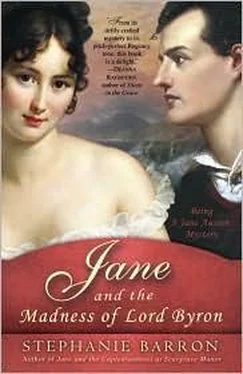She swayed as she stood, peering about the stable yard in apparent terror; nothing less like the picture of rebellion could one conceive. Her flounce was torn, and I observed her hands to tremble as she felt her swollen lips.
“Who has done this to you?” I asked.
But Miss Twining was no longer attending. Her palpitating gaze was fixed on the door to the inn, where a second figure had joined the innkeeper: a gentleman by his air and address, clothed all in black, his shoulders broad and his countenance pale under a mass of dark curls. He was a stranger to me—and yet, there was a something in his profile that tugged at memory, as tho’ I ought to know his name.
“Oh, Lord,” Henry muttered under his breath.
The gentleman had evidently seen us; his countenance altered. A storm of anger blew across his brow, and he made purposefully across the yard, violence in every jarring step. For despite his appearance of youthful vigour—his inordinate beauty of face and form—he walked with a painful limp; his right foot was the culprit, and marred every step he made.
Beside me, Miss Twining let out a squeak—then fell senseless to the mud.
“Henry,” I gasped, as we both bent to assist her, “who is that man?”
“George Gordon,” he returned grimly, “Lord Byron. And if I do not mistake, Jane, he is about to challenge me to a duel.”
LORD BYRON. THREE SYLLABLES, THAT IN ANY OTHER case—were they, for example, as commonplace as Mr. Johnson —should excite not the slightest interest. Mr. Johnson may claim neither the ready curiosity of the literary-minded, nor the excited beat of the romantic heart. But Lord Byron!—Who broke upon the notice of the Fashionable World but a year since, with the publication of his epic poem, Childe Harold’s Pilgrimage —the tale, in verse, of a wanderer through Attic climes, which has aroused the passions of more females between the ages of ten and seventy than any work of genius in the last century or this; Childe Harold , which has actually set a fashion in dressing ladies’ hair à la grecque , and has made of its author a Darling of the haut ton; Childe Harold , which drove no less notorious a sprite than Lady Caroline Lamb to make a public spectacle of herself, mad with love and bent upon exposing her poor husband to all the ridicule of his dearest acquaintance; Childe Harold , both cantos of which, published in succession, my lamented Eliza was good enough to send me by carrier, direct from Hatchard’s book shop, and which I found (to my disappointment) I liked only moderately well.
“You have interfered in my concerns, sir,” Lord Byron declared as he reached our little party. “And I must demand to know the reason for it.”
“Any gentleman should have done the same,” Henry replied through compressed lips, “had he witnessed the outrage visited upon Miss Twining’s person. Now I must beg you to stand aside; she requires immediate attention.”
My brother had lifted the girl’s inert form, and meant to bear her into a private parlour; but Lord Byron stood firmly in Henry’s path.
“Outrage!” he repeated. “She came to me willingly enough. I call it an outrage when a stranger meddles in affairs not his own. You will oblige me by depositing the young lady back inside her conveyance, sir. If you do not—I shall know how to act.”
“Lord Byron—it is Lord Byron, I collect?”
The gentleman glanced at me smoulderingly. “That is my name. All the world seems acquainted with it.”
“And thus the more reason you should behave with care. Not all publicity can be to your liking. We are in a posting yard, my lord. Do you wish to invite enquiry? Miss Twining shall not support your assertions. Indeed, she may well bring down the Law upon your head.”
He held my gaze an instant; then observed the ostlers, racing to meet another carriage—full of Fashionables, by its appearance—with a second approaching behind. The traffic of the day was constant; who knew when he might encounter a friend—or an enemy?
“It is not I who would excite comment. You might end all conjecture by depositing her within my chaise,” he said evenly.
But Fate, in the form of Mr. Puffitt, intervened.
“Ah,” the innkeeper wheezed as he lumbered towards us, “overcome by the heat, is she, pore young thing? Do you carry your daughter into the house, sir,” he said with a beaming nod for Henry, “and Mrs. Puffitt shall see as she’s attended to.”
“Thank you,” Henry answered brightly. “I am sure she shall revive in a moment; she was never a stout traveller, I am afraid—you are very good, Puffitt.”
Bowing to Lord Byron, the innkeeper gestured for us to precede him. Henry stepped carefully with his insensible burden through the mud.
I made to follow, but halted as a strong hand grasped my arm.
“You have won this round,” Lord Byron muttered in my ear, “but do not flatter yourself the matter is done. I will have your brother’s name and direction.”
I stared calmly into his glittering eyes. What countenance he possessed! The features nobly drawn, firm in every outline; the lips full and sensual; the pallor of the skin akin to a god’s beneath the dark sweep of hair. It was the face of an angel—but a fallen one. Lucifer’s visage must have held just such heartrending beauty.
“You might have had name and direction both, my lord,” I replied, “had you behaved in a more gentleman-like manner.” And left him drawing his gloves furiously through his hands.
“I AM MISS AUSTEN,” I SAID QUIETLY, TAKING UP A PLACE by the bow window of Mr. Puffitt’s private parlour, “and that gentleman is my brother, Mr. Austen. You are perfectly safe, now, Miss Twining. Lord Byron has gone. Do not attempt to speak, I beg of you, until you are somewhat recovered.”
She had revived enough to open her eyes and gaze wonderingly around her; then she lay back upon the sopha and drew a shuddering breath. “Papa,” she said faintly, “shall be so very angry. ”
“Papa will be only too thankful to have you restored to him,” I returned. I searched in my reticule for a handkerchief—I was in ample possession of them, Manon having hemmed several dozen in black—and knelt down beside the girl.
“You have a smear of mud on your cheek. Will you not allow me to wipe it clean?”
“You are very good,” she said gratefully, “but oh, Miss Austen, I wish that I were dead !”
“Come, come,” my brother muttered, in some discomfort.
“Henry—do you go in search of brandy,” I suggested.
He quitted the parlour with alacrity.
I dabbed at Miss Twining’s cheek. “Nothing, in my experience, is quite beyond remedy— except death. I must encourage you to determine to live, Miss Twining. You shall undoubtedly discover that tomorrow is a far better day than the present one.”
She had begun to weep; I pressed a second—and far cleaner—handkerchief in her hand, and awaited the return of my brother with restorative spirits.
He appeared within a few moments, bearing a tot of brandy on a tray. For myself, he had fetched a glass of ratafia and a plate of biscuits; in his free hand he clutched a tankard.
“Drink this,” I urged Miss Twining as I offered her the glass. “You shall be much the better for it.”
“But Papa is most strict in deploring strong spirits as an intervention of the Devil,” the girl said doubtfully. On closer examination, she was excessively pretty, with a naïveté of manner that encouraged me to think she had played no part in her own abduction; here was a victim of depravity if ever I beheld one. The clarity of her vowels and the ingenuousness of her manner betrayed the gentlewoman, not to mention Papa’s care—God be praised there was a Papa somewhere—for her upbringing.
Читать дальше












